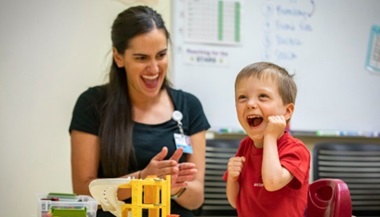Stages of Language Development and Other Speech Issues
How to Identify a Speech, Language or Feeding Issue in Kids
Nearly 8 percent of children in the United States ages 3-17 have had a disorder related to voice, speech, language or swallowing in the past 12 months, according to the National Center for Health Statistics. On this week’s On Call for All Kids, Therese Montanari, the director of the Speech-Language and Feeding program at Johns Hopkins All Children's Hospital, discusses pediatric speech-language issues and how the hospital’s 60 speech-language pathologists provide assessment and treatment.
What do speech pathologists do?
Speech pathologists evaluate and treat children with a wide variety of communication delays — children who are not talking, who are talking but others do not understand their speech, and children who have speech, language or feeding difficulties associated with various diagnoses such as autism, hearing impairment, and apraxia of speech. We also treat patients who have feeding issues associated with a variety of medical conditions and may be interfering with their growth or disrupting the family’s mealtime experience. We also see children with stuttering and voice disorders.
How can parents help their child learn to speak?
Being a good language model starts in infancy. Respond to your baby when he or she smiles or laughs. Look at your baby when he or she makes sounds. Read to your baby and toddler. Model words to build a vocabulary. Give choices: Do you want your baby or block, banana or apple? Add on to what your child says. When a child says “car,” you say, “big car.” PLAY, PLAY, PLAY! … Children learn language through play. Ask questions during play. Talk about what you are playing with. Here’s the dog. He says, “ruf ruf.” When you read to your child, ask “What’s this?” or “Where is the______” to work on comprehension. Take advantage of language in a variety of daily activities, from grocery shopping, bath time, meals and outside play.
When do babies talk?
There are expected ages that language develops. For example:
- 6-12 months: laughing, cooing/babbling with a variety of vowels and consonants,
- 12-18 months: first words emerge, and vocabulary is starting to expand, mama, dada, bye bye, up;
- 2 years: expressive vocabulary between 50-100 words, two- to three-word phrases, following simple commands.
If a caregiver is noticing that the child is not doing what other children that age are doing, he or she should discuss concerns with the health care provider or reach out to a certified speech-language pathologist. Research has shown that birth to age 3 is a critical time period for brain development and for that reason the earlier the better if you have concerns about your child’s speech and language development.
Why do kids have speech delays?
A speech delay can be correlated with a number of reasons, a few of which include: hearing impairment, neurological/medical issues such as autism, cerebral palsy, Down syndrome, prematurity, cardiac or developmental delays. As stated earlier, early intervention is the key.
Why is early intervention so important?
One of the main reasons to identify speech, language and feeding disorders at an early age is to initiate intervention to reduce negative behaviors, behavioral problems often associated with a child who cannot express himself as well as he understands, implementing strategies and suggestions for parent training/implementation.
What are signs of feeding issues?
Red flags include poor intake/weight gain or growth, limited acceptance of certain foods/textures, refusing food or liquid, coughing, gagging, or choking during feeding, significant struggles at mealtime.
What are some strategies to help with picky eating?
- Positive exposure to food: reading books about food, helping put food/groceries in the cart, helping with prep (stirring).
- Provide independence/control within boundaries, let them self-feed, touch and experience food, get messy.
- Offer choices: “Do you want red or blue spoon?”, “applesauce or pudding?”, “dog or cat plate?”
- Having a meal routine, it is very important for toddlers to have a routine, sitting at the same table for dinner, child helping set the table, try not sitting in front of television, no electronics at the table.
Speech-Language and Feeding Services at Johns Hopkins All Children's Hospital







